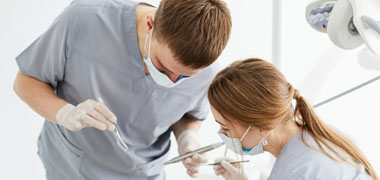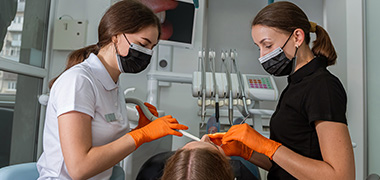
AI Occupational Exposure score unavailable For more insight, research the specific tasks and skills required for the role.
Explore all careersProsthodontists specialise in creating and fitting prosthetic devices for patients with missing teeth or facial deformities, ensuring functional and aesthetic outcomes.
Get qualified to work as a Prosthodontist with a course recognised across Australia. Speak to a training provider to learn more.
The weekly salary for a Prosthodontist in Australia generally ranges from approximately $4,500 to $8,000. Increase your earning capacity by undertaking post-graduate qualifications in specialist areas like orthodontics, periodontics, oral surgery, public health, or international aid.
 Courses.com.au Team
Courses.com.au Team
There are 1,400 Dental Specialists currently employed across Australia, this includes qualified Prosthodontists. They mainly work in private practice but some are employed by government health providers.
 Courses.com.au Team
Courses.com.au Team
Becoming a fully qualified Prosthodontist in Australia is a long-term commitment to your education and professional development. The steps are as follows:
Source: Australian Government Labour Market Insights 2024
 Courses.com.au Team
Courses.com.au Team



Prosthodontists are qualified dentists who specialise in the design and installation of prosthetic devices for your teeth and mouth. They help patients who have missing teeth, have suffered injuries to the mouth and jaw, or have congenital (or disease-related) deformities to the cleft lip and palate.
As a Prosthodontist you could be meeting with your assistant to review the day’s patient list, conducting an oral exam on a new patient who has a congenital deformity of the cleft lip and palate, examining dental x-rays of a patient who was injured in the face while playing sport, performing restoration surgery for a patient who has a deformity of the face due to cancer, discussing a change to the treatment plan with a long-term patient, writing up correspondence for the laboratory technicians, calling a patient to discuss the results of a diagnostic test, or just having a few moments of self-care between appointments.
To succeed in this occupation you must be committed to academic and technical excellence in dentistry and have outstanding interpersonal and communication skills.